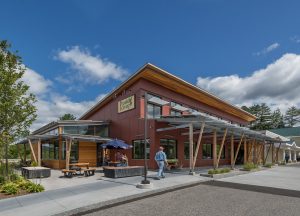
Photo taken by: Gary Hall
The Littleton Coop is a member-owned grocery store featuring local produce, hot prepared foods, deli, bulk foods, craft beer, wine and a quality grocery selection.
Member-owned Littleton Consumer Cooperative Society, Inc. strives to serve the North Country of New Hampshire and Northeast Kingdom of Vermont by providing a broad range of high quality food products, offered at a fair price, with outstanding service.
The Co-op exists to serve its members, not to make a profit for a large corporation. While membership is not required to shop at our store, our member-owners help govern the Co-op by electing our Board of Directors annually and contributing in other ways – from suggesting items for the store to serving as volunteers on Co-op committees.
Our members also help us maintain the Co-op’s mission of supporting local growers and producers, encouraging healthy life choices, and promoting environmental sustainability locally.
The movement to bring a regional cooperative food store to Littleton began in early 2006. The initial informational meeting, called by Co-op President Jeffrey Wheeler and Vice President Michael Claflin, drew an enthusiastic crowd of more than 300 people from Littleton and surrounding towns in both New Hampshire and Vermont.
The Littleton Food Co-op Store opened in May 2009 and expanded in 2016. Our 17,660-square-foot store is located at the intersection of Route 302 and Cottage Street, making it convenient to both Littleton’s celebrated downtown and Interstate 93.
Littleton Food Co-op exists so that we have a vibrant regional economy in which:
● Employees have a safe and supportive work environment;
● Local producers are offered a market for their products;
● Members and customers can make environmentally sustainable choices;
● The community has a safe and inclusive space to shop and gather.
Our Vision
Our Co-op is a catalyst for cultivating a vibrant community and regional economy.
Our Mission
To provide a community owned marketplace that supports local and promotes healthy choices for people and planet.
Diversity, Equity, & Inclusion Statement
We, the Littleton Food Co-op, envision a thriving, inclusive culture that represents the growing variety of experiences and backgrounds within our community.
We stand to celebrate all identities as vital to our ecosystem. Along with our commitment to cooperative values, we invite you to use your voice and presence. Together, we will co-create a local marketplace that is accessible, democratic, and sustainable.
Learn more about our commitment to DEI at the Co-op.
The Cooperative Principles
1. Voluntary and Open Membership
Cooperatives are voluntary organizations, open to all persons able to use their services and willing to accept the responsibilities of membership, without gender, social, racial, political or religious discrimination.
2. Democratic Member Control
Cooperatives are democratic organizations controlled by their members, who actively participate in setting their policies and making decisions. Those serving as elected representatives are accountable to the membership. In primary cooperatives, members have equal voting rights (one member, one vote) and cooperatives at other levels are also organized in a democratic manner.
3. Member Economic Participation
Members contribute equitably to, and democratically control, the capital of their cooperative. At least part of that capital is usually the common property of the cooperative. Members usually receive limited compensation, if any, on capital subscribed as a condition of membership. Members allocate surpluses for any or all of the following purposes: developing their cooperative, possibly by setting up reserves, part of which at least would be indivisible; benefiting members in proportion to their transactions with the cooperative, and supporting other activities approved by the membership.
4. Autonomy and Independence
Cooperatives are autonomous, self-help organizations controlled by their members. If they enter into agreements with other organizations, including governments, or raise capital from external sources, they do so on terms that ensure democratic control by their members and maintain their cooperative autonomy.
5. Education, Training, and Information
Cooperatives provide education and training for their members, elected representatives, managers, and employees so they can contribute effectively to the development of their cooperatives. They inform the general public – particularly young people and opinion leaders – about the nature and benefits of co-operation.
6. Cooperation Among Cooperatives
Cooperatives serve their members most effectively and strengthen the cooperative movement by working together through local, national, regional and international structures.
7. Concern for Community
Cooperatives work for the sustainable development of their communities through policies approved by their members.






